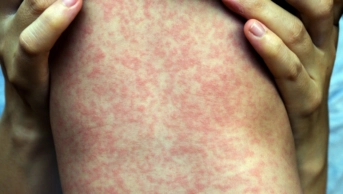
Shutterstock.com
Teething products which contain lidocaine will be sold as a pharmacy-only (P) medicine from 2019, the UK’s drugs safety watchdog, the Medicines and Healthcare products Regulatory Agency (MHRA), has announced.
The decision means that the products will not be available over-the-counter in the current wide range of settings including supermarkets, following a review which found a lack of evidence that they relieved the symptoms of teething.
Patient advice about the products is also being updated following the results of the MHRA review.
The Agency said lidocaine-containing teething products should only be used as a “second-line treatment” when non-medicinal options, such as a cooled teething ring, failed to provide the necessary relief for babies and children.
The MHRA, which recommended parents and carers discuss teething relief options with their community pharmacist, concluded that the risks of using lidocaine-containing products for soothing symptoms of teething was “very small” given wide use of the products.
The review was prompted by the US Food and Drug Administration’s (FDA’s) decision that oral viscous lidocaine 2% solution available on prescription should not be used for treating teething problems in babies and young people because it posed serious health risks, including death. The FDA added that a boxed warning label should be displayed on the product.
In a statement, the MHRA said: “Our review, which began following the FDA changes, looked at the safety of these products and measures have been recommended to ensure their safer use. Pharmacists and healthcare professionals are best placed to provide guidance on supporting parents through teething if non-medicinal methods are not sufficient.”
The MHRA confirmed that oral viscous lidocaine 2% solution is not available in the UK for infants.
The Royal Pharmaceutical Society has worked with the MHRA on a Quick Reference Guide
on the use of oral lidocaine-containing products. The guide, aimed at pharmacy teams, covers the changes that have been made since the review and explains how to advise parents seeking advice or treatment for teething infants.
You may also be interested in

Have parents’ views on using community pharmacy services for children in the UK changed over the past ten years?

Measles vaccinations should be compulsory for pre-school children, study concludes
